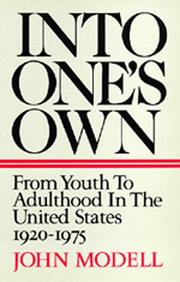| Listing 1 - 3 of 3 |
Sort by
|
Dissertation
Year: 2016 Publisher: Liège Université de Liège (ULiège)
Abstract | Keywords | Export | Availability | Bookmark
 Loading...
Loading...Choose an application
- Reference Manager
- EndNote
- RefWorks (Direct export to RefWorks)
Cette étude interroge la dimension politique de la culture hip-hop durant les années Obama (2008-2016). A partir d'une synthèse théorique de plusieurs recherches interrogeant la signification de l'identification à la culture hip-hop, nous proposons que cette dernière offre à ses adeptes un cadre d'adaptation et d'intégration qui peut être instrumentalisé pour remplir des objectifs très divers. Cette hypothèse se confirme par l'analyse du corpus de textes de chansons rap constitutifs de notre terrain. La dimension politique du hip-hop à l'ère Obama se traduirait alors comme une lame de fond agissant en soubassement et ayant la capacité d'influencer l'engagement et la mobilisation des populations sur lesquelles elle s'exerce.
culture --- hip-hop --- engagement --- social movement --- political opinions --- culture --- hip-hop --- engagement --- mouvement social --- opinions politiques --- Droit, criminologie & sciences politiques > Sciences politiques, administration publique & relations internationales

ISBN: 0520041364 0520076419 052091192X 0585338884 0520341376 Year: 1989 Publisher: Berkeley, CA : University of California Press,
Abstract | Keywords | Export | Availability | Bookmark
 Loading...
Loading...Choose an application
- Reference Manager
- EndNote
- RefWorks (Direct export to RefWorks)
Tracing the life course of American teenagers in the mid-twentieth century, Into One's Own presents a compelling historical portrait of growing up.
Marriage --- -Young adults --- -Youth --- -Young people --- Young persons --- Youngsters --- Youths --- Age groups --- Life cycle, Human --- Young people --- Adulthood --- Youth --- Married life --- Matrimony --- Nuptiality --- Wedlock --- Love --- Sacraments --- Betrothal --- Courtship --- Families --- Home --- Honeymoons --- History --- -History --- Young adults --- 20th century american culture. --- 20th century american history. --- adulthood. --- america. --- american culture. --- american history. --- american teenagers. --- american youth. --- baby boom. --- childrens studies. --- cultural studies. --- first world war. --- gerontology. --- great depression. --- growing up. --- historical context. --- historical portrait. --- modern youth. --- modernism. --- political opinions. --- protest. --- roaring twenties. --- second world war. --- social sciences. --- teenagers. --- united states of america. --- young adults.
Book
ISBN: 0691158568 1400848652 Year: 2013 Publisher: Princeton, NJ : Princeton University Press,
Abstract | Keywords | Export | Availability | Bookmark
 Loading...
Loading...Choose an application
- Reference Manager
- EndNote
- RefWorks (Direct export to RefWorks)
In the Interest of Others develops a new theory of organizational leadership and governance to explain why some organizations expand their scope of action in ways that do not benefit their members directly. John Ahlquist and Margaret Levi document eighty years of such activism by the International Longshore and Warehouse Union in the United States and the Waterside Workers Federation in Australia. They systematically compare the ILWU and WWF to the Teamsters and the International Longshoremen's Association, two American transport industry labor unions that actively discouraged the pursuit of political causes unrelated to their own economic interests. Drawing on a wealth of original data, Ahlquist and Levi show how activist organizations can profoundly transform the views of members about their political efficacy and the collective actions they are willing to contemplate. They find that leaders who ask for support of projects without obvious material benefits must first demonstrate their ability to deliver the goods and services members expect. These leaders must also build governance institutions that coordinate expectations about their objectives and the behavior of members. In the Interest of Others reveals how activist labor unions expand the community of fate and provoke preferences that transcend the private interests of individual members. Ahlquist and Levi then extend this logic to other membership organizations, including religious groups, political parties, and the state itself.
Labor unions --- Labor movement. --- Political activity. --- ILWU leaders. --- ILWU members. --- International Brotherhood of Teamsters. --- International Longshore and Warehouse Union. --- International Longshoremen's Association. --- Maritime Union of Australia. --- Waterside Workers' Federation. --- activist unions. --- aggregate behavior. --- altruism. --- business unions. --- cooperation. --- economic opportunities. --- economism. --- equilibrium selection. --- ethnic divisions. --- governance arrangements. --- governance equilibrium. --- governance. --- ill-formed beliefs. --- individual members. --- industrial efficacy. --- information acquisition. --- internal heterogeneity. --- international trade. --- labor organization. --- labor unions. --- leadership rents. --- members. --- membership organizations. --- national-level organizations. --- nationalist groups. --- organization governance. --- organizational governance. --- organizational leaders. --- organizational leadership. --- organizational norms. --- political activism. --- political beliefs. --- political causes. --- political commitments. --- political mobilization. --- political opinions. --- religious divisions. --- selective incentives. --- self-selection. --- social justice. --- social networks. --- solidarity. --- state-building. --- trade liberalization. --- trade restrictions. --- union activities. --- union activity. --- union leaders. --- union. --- unions. --- volunteering.
| Listing 1 - 3 of 3 |
Sort by
|

 Search
Search Feedback
Feedback About UniCat
About UniCat  Help
Help News
News